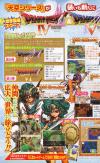Dragon Quest IV-VI remakes headed to the DS |
|
Dragon Quest IV through VI are loosely bound together under the moniker of the Zenithia trilogy. Following three 8-bit NES titles whose thematic unity is grounded upon the legend of the Dragon knight Erdrick, Dragon Quest IV introduces the Zenithia sky castle into the series' mythical structure. In Japan the trilogy is dubbed the Tenku (天空) or heavenly series. They might also be called the wagon trilogy, since they introduced the means of transportation allowing players to change characters during battle.
Dragon Quest IV appeared on the 8-bit Famicom game system in February of 1990 in Japan. Its subtitle translated to "Those Who Are Shown the Way." The title was localized for North American release over two years later, by then mostly overshadowed by the appearance of the Super Nintendo game console. Considered a landmark achievement among NES games, the cartridge is highly sought after as a collectible to this day. In 2001, the Famicom game was remade for the Playstation, but never made its way stateside. Enix and Chunsoft's Mysterious Dungeon and Torneko spin-off series can be traced back to the popular merchant character of this game title.

Dragon Quest V was dubbed "The Bride of Heaven," introducing the Tenku character into the subtitle. The game takes place 500 years after Dragon Quest IV and takes place over twenty years of the protagonist's life, following him through adulthood and marriage. Like its predecessor, the story is broken up into chapters. The first title in the series to be denied stateside release, in 2004 it received a Playstation 2 remake. Again English-language players were snubbed, as no localization efforts were undertaken.
Dragon Quest VI was the last title for the Enix role-playing series to appear on the Super Famicom. The class system, first found in Dragon Quest III, returned. And for the first time, character animations were added to enemies during battle scenes. The game was subtitled "The Great Land of Illusion," and included two world: reality and a dream world where the main antagonist resides. For what it's worth, GamePro named Dragon Quest VI one of the ten best game titles never released outside Japan. While several fan translations have been attempted, none have attained 100% completion.
All three DS games will be guided in their art direction by Arte Piazza, the computer graphics illustration company behind the Playstation remake of Dragon Quest IV and Playstation 2 remake of Dragon Quest V. The head of Arte Piazza, Shintaro Majima, served as illustrator on Dragon Quest VII and is currently acting as the producer and character designer of the Wii game title Opoona. As the trilogy of Dragon Quest remakes will likely see a stateside release at some point in the not-too-too-distant future, for English-language fans of the series news of the remakes promises an opportunity to experience the games outside the realm of import and emulation.
Currently no date is set for the Zenithia trilogy for the Nintendo DS, although the development time for portable titles is typically shorter. Square Enix is aiming for a Winter release for Dragon Quest IV. Just how the new games will make use of the dual screens and stylus has only been hinted at in the Shonen Jump scans. More info should be coming soon. Check the official website for progress updates.
Dragon Quest IV Shonen Jump scans
Forums / News / Dragon Quest IV-VI remakes headed to the DS
|
staff |
|
| Topic #1464 | Invisible to nobody | Closed to nobody |
|---|
Copyright © 1998-2025 Square Haven. This material may not be published or rewritten without crediting Square Haven as the author. Terms of Use






